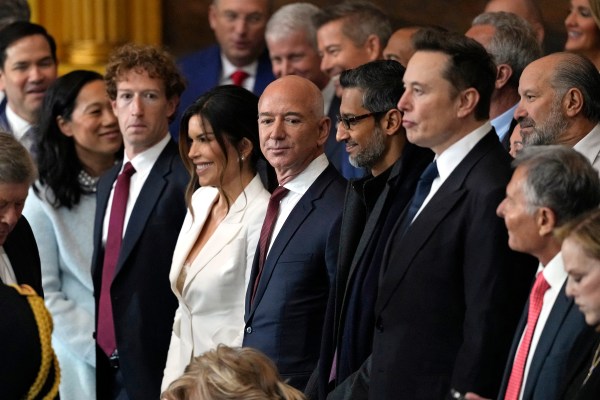In his historic address before Congress on Wednesday, Ukrainian President Volodymyr Zelensky declared a victory of sorts. Acknowledging the contributions of the United States and Europe, he said, “We defeated Russia in the battle for minds of the world. We have no fear, nor should anyone in the world have it.” But there is still the matter of the battle for Ukraine itself. Ukraine cannot win without continued support from the United States. And even as Zelensky was meeting with President Biden at the White House on Wednesday, opponents of that support were making themselves heard.
House Republicans like Marjorie Taylor Greene, Matt Gaetz, and Paul Gosar spent the day arguing that it was not in America’s interest to defend Ukraine and that we should put “America first.” And many Americans dislike issuing “blank checks” to Ukraine or are exhausted with “forever wars.” The fact is, victory in Ukraine is not only in America’s interest, it’s absolutely necessary if Americans want to avoid a forever war in Europe.
The good news: Ukraine is currently winning. At every stage of the war, Ukrainian forces have outfought and outfoxed Russia. They have repeatedly embarrassed the doom casters and defeatists who either predicted a swift Russian victory or a hopeless stalemate. Since February, Ukrainians have reclaimed an astonishing 25,000 square miles of their land—an area nearly the size of Florida—and set the conditions to restore full sovereignty over their country, including Crimea. This is not what a forever war looks like. Ukrainians have demonstrated that they can finish the fight that Russia started if given the tools, technology, and weapons to do so.
Advocates for a hasty “peace” with Russia make two fundamental miscalculations. First, they assume that Russia will negotiate in good faith and keep its promises. The Kremlin’s track record says otherwise.
When Western leaders attempted to broker a Russo-Ukrainian ceasefire on disadvantageous terms under the Minsk I and Minsk II formats in 2015, Kremlin negotiators ran circles around them. These agreements did not end the war for Ukraine. Rather, they solidified Putin’s initial war aims, compromised Ukrainian sovereignty, and enabled Moscow to launch its still larger invasion of the country in 2022. Putin can snatch a victory at the negotiating table from his flaming defeat on the battlefield by temporarily freezing the conflict. This would grant Russia the territory, time, and space that it needs to reconstitute its forces, rearm, and attack with far greater force in the future. The cycle of conflict will never end unless Ukraine can establish the conditions for a good and lasting peace.
The peace camp also assumes that Russia will stop with Ukraine. On the contrary. Putin has been explicit about his aims: to “return” Russia’s lost lands from Europe. This puts America’s allies in Poland, the Baltic States, and Finland—an incoming member of NATO—in the bullseye of future Kremlin wars. As many setbacks as Russia has faced on the battlefield, Putin has proved entirely willing to throw more soldiers into battle and extremely reluctant to admit any weakness. He remains a threat. The surest way to create a constant state of danger and conflict in Europe is to hoist a bad “peace” upon Kyiv and hope that Putin will be satisfied. He will not be.
The alternative to a bad peace with Russia is a clear Ukrainian victory. Even as Biden pledged his continued support for the war on Wednesday, it is incumbent on him to state clearly what victory for Ukraine looks like. There are many options. Here are four critical ones:
First, Ukraine must reclaim all its stolen lands. No greater deterrent exists to future Russian aggression than a stunning loss like that. Second, Ukrainians must have the means to rebuild. America and its allies can create a mechanism to redirect a portion of Russian energy sales to the reconstruction of Ukraine. The United Nations has already taken the first political step in this direction; however, to make reconstruction a reality, Washington will need to lead from the front by rallying the G-7. Third, the Kremlin must repatriate all of Ukraine’s citizens, particularly its children, which Russian officials have removed from the country. The ethnic cleansing of Ukrainians, and the theft of its children, has been one of the most egregious of Russia’s many crimes during the war. Repatriation must be a priority in the international restitution process for Russia’s war crimes.
Finally, Ukraine must become a member of NATO. Kyiv has initiated its formal application to join the alliance; NATO maintains an “open door” for membership to every democracy in Europe. It would greatly benefit American interests to have Ukraine’s military—one of the best in Europe if not the world—in the alliance. More importantly, this would eliminate Russia’s ability to invade Ukraine in the future.
Putin wants a protracted war in Ukraine in order to exhaust Western will and capacity. Endless conflict with Ukraine is a dream come true for him: As the war drags on, the West will grow tired and lose its focus. In contrast, a unified West has the capabilities to assist Ukraine on the battlefield. The sooner that Ukraine wins, the faster we can prevent future wars in Europe.






Please note that we at The Dispatch hold ourselves, our work, and our commenters to a higher standard than other places on the internet. We welcome comments that foster genuine debate or discussion—including comments critical of us or our work—but responses that include ad hominem attacks on fellow Dispatch members or are intended to stoke fear and anger may be moderated.
With your membership, you only have the ability to comment on The Morning Dispatch articles. Consider upgrading to join the conversation everywhere.